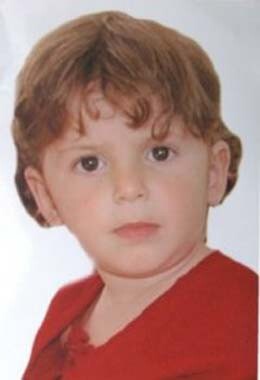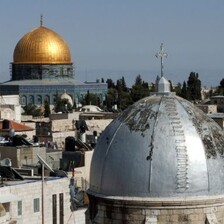
Rafeda Thaer, a three-year-old Palestinian girl killed at an Israeli checkpoint.
“During 2005 some of the world’s most powerful governments were successfully challenged, their hypocrisy exposed by the media, their arguments rejected by courts of law, their repressive tactics resisted by human rights activists.”
“Nevertheless, the lives of millions of people worldwide were devastated by the denial of fundamental rights.”
The report documents human rights abuses by country; Israel/Occupied Territories and Palestinian Authority are listed as two distinct categories. The classification is slightly confusing, given that the bulk of abuses listed under Israel relate to Palestinians under occupation and the abuses within Israel proper, are only mentioned in passing or are missing all together. An analysis of the structure of the report and issues chosen to document is worthy of an article of its own.
Instead, here, I wish to bring to life one of the examples that may, or may not, show up in the Amnesty International 2007 report. It is the example of a three-year-old Palestinian girl whose skull was crushed at an Israeli checkpoint in the West Bank. The death of this child, Rafida Bader, barely got noticed in the Palestinian press, let alone the Israeli and international media.
After seeing a brief mention of this tragic story online, at maannews.net, I posted the story with a portrait of the beautiful red-head girl to my mailing list, epalestine.com. Within minutes, an Israeli virtual friend who works with Israeli human rights organizations, passed the post to two Israeli activists mailing lists, New Profile: Movement for the Civil-ization of Israel Society and Machsom (Hebrew for Checkpoint) Watch. Several questions came back, all wanting more details in order to take action. Soon afterwards, a Palestinian journalist, Azziah Nawal, was commissioned to follow-up the story, parts of her report are included below.
It was April 26, 2006 and Rafida was preparing to visit her father, Thaer Bader, who is a political prisoner being held by Israel since December 18, 2005. Since the Israeli occupation began in 1967, it is estimated that out of approx 3.5 million Palestinians over 650,000 Palestinians have been arrested at one time or another. On any one day over 10,000 Palestinians are detained by the occupation forces. There are not individual ex-prisoners in occupied Palestine, but rather communities of ex-prisoners.
The Morning
Thaer was awaiting his family to visit from Beit Lekya, his village that is besieged by Israel’s Separation Wall. He was not sure who exactly would be his visitors this time or what kind of news they would bring. He was busy in his cell thinking of how to receive his family. He never thought in his worst nightmares that, instead of the joy of receiving his family, he would receive the news of his daughter’s fatal injury which led to her death.
At home, Thaer’s daughter Rafida was rushing to her fate. She woke early in the morning and then woke her mother, wanting to get an early start on the long trip to her father. She refused to accept the fact that she awoke too early. She proceeded to wake up her cousin and aunt and put on new clothes for the visit.
Rafida was joyous. With her mother and aunt, she headed to the Red Cross office in Ramallah where all the prisoners’ families meet for transportation to the prison for visits. Rafida’s mother said that this has been the routine every month since her husband was arrested. The Israelis make it mandatory that visiting families use the Red Cross buses. They reached the Red Cross office at 5 AM and had to wait until 8 before boarding the bus and heading to the Mod’in Checkpoint, near the Palestinian village of Beit Sira, west of Ramallah. There they were forced to wait for a few hours.
The Incident
Rafida’s mother narrated the details of the trip. While speaking she seemed as if in another world, almost hallucinating. She said,
“While we were in the Red Cross’ buses waiting at the checkpoint to be allowed to pass, kids accompanying their visiting families got off the buses to play, including Rafida who got out and returned to the bus several times. The last time, she asked to use the toilet. As I was so tired and carrying her 16 months old infant brother, Omar, I asked her aunt to accompany her.”
“She was singing verses of her favorite song, which she used to watch on her favorite TV channel, Space Toon. Every time the song would come on, Rafida would turn the TV volume to the maximum.”
The mother continued,
“Only a few minutes after Rafida got off the bus with her aunt, screaming spread all over the place. Your daughter! I didn’t know what to do. I laid my infant on the floor of the bus and rushed to the accident scene; Rafida was dead, I felt it. I put her in my lap and didn’t allow anyone to get close to her. Someone said, I am a nurse, let me treat her, but I didn’t let her do anything, saying, leave her dead in my lap. After a few moments, that felt like a year, I felt her breathing and screamed for an ambulance.”
Rafida, still singing, was walking past the iron gate accompanied by her aunt. The gate swung back fast by the strong wind and Rafida’s head was stuck between the bars of the iron gate. Her aunt tried to rescue her, but her efforts were in vain. Within seconds, Rafida’s head was crushed.
Rafida lay in her mother’s lap with just a breath separating her from death. Her mother said that the minutes passed like years while she shifted between thoughts that her daughter had already passed away and hopes of the possibility to rescue her.
The Israeli soldiers manning the checkpoint gathered and moved everyone back from the scene as an ambulance arrived. She was transferred to the Israeli Tel Hashomer Hospital in Tel Aviv after the paramedics applied first aid.
The mother, whose origin is from the predominantly Palestinian city in Israel, Kufur Kana in the Galilee (Israeli Palestinians account for some 20% of the population of Israel), said,
“On the first day, they said she was breathing. On the second day, they said blood doesn’t circulate to the head and oxygen doesn’t reach the brain. On the third day, they said she was dead. I wasn’t in need of the explanations that the doctor tried to make it in Arabic, as I speak Hebrew fluently, which added to my pain as I listened to the medical staff speak of her deteriorating status for the three straight days.”
“Her head was ground like dough. I can not imagine the way she looked after the horrible injury. I still see her before me everywhere, and I get scared of the most trivial noises, especially the crying of my little child, Omar.”
The minute Rafida’s imprisoned father heard the tragic news he appealed to the Israeli Prison Authorities to allow him to visit his dying daughter in the hospital. Although his request was accepted in principle, the Prison Authorities procrastinated until after she passed away. He never saw her alive.
The mother added,
“On my next visit to her dad in his prison, I couldn’t stand the way he looked. He was extremely sad and depressed, which made me cry throughout the entire visit. He kept asking about the other kids as if he wants to make sure that none had the same fate of Rafida. Rafida had a special place in his heart. She would barely let anyone else visiting speak to her father when she visited.”
Who’s to blame?
No shots were fired. No tanks were shelling. No fighter planes were bombing. Rafida died because of the mere presence of the 40 year Israeli military occupation. She is the latest victim of the presence of hundreds of sadistic checkpoints that separate Palestinians from Palestinians and Palestinians from the rest of the world. She died to see her father who is also paying a price for yearning to be free. His death will be much slower. The daily torment Rafida’s mother must face while rearing the next generation of Palestinians is unthinkable.
Maybe it is incidents such as this that explain why the Amnesty International 2006 Report notes for Israel that, with regard to the International Criminal Court, it was “signed but [with a] declared intention not to ratify.”
The Amnesty Report does shed a ray of hope. Under the Israel chapter, a section titled, Imprisonment of conscientious objectors, states:
“Several Israelis who refused to serve in the army because they opposed Israel’s occupation of the Occupied Territories and refused to serve there were imprisoned for up to four months. They were prisoners of conscience.”
What is it in the nature of occupying soldiers that allows them to leave their checkpoint or prison duty and go home to their kids, brothers and sisters, surely all as precious as Rafida was? How can they hug and kiss their own and return to duty the next day and act as if its business (or it that occupation) as usual?
Every day of occupation, whether it witnesses us burying our young or not, eats away at each of us. Whether those checkpoint and prison soldiers want to admit it or not, they too are being eaten from the inside. The only difference is they have the option to refuse to serve.
Sam Bahour is a Palestinian-American living in the besieged Palestinian City of El-Bireh in the West Bank. He is co-author of HOMELAND: Oral Histories of Palestine and Palestinians (1994) and can be reached at sbahour@palnet.com.
Related Links





